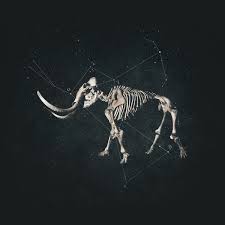I watched Anímic, long-celebrated by Spain’s music press, open the Pitchfork Stage at Primavera Sound a couple of years ago, on an afternoon of typically glorious Mediterranean sunshine. Conditions weren’t ideal: the band deal in brooding, minor-key songs that rumble along at their own, unhurried pace – hardly befitting such bright surroundings – yet it was a great set, and one that ended in a memorable psychedelic swirl.
Last Valentine’s Day, a group of Catalonia’s best and brightest alternative acts rallied together to put on a concert in Barcelona in order to raise funds for singer Louise Sansom, who fronts the band alongside her husband, Ferran Palau. Sansom was suffering from a debilitating back condition, and although the fundraiser and subsequent operation were resoundingly successful – Hannibal is dedicated to those who set up the event as well as the numerous hospital staff who aided in her rehabilitation – the months of pain Sansom endured played into the gestation of the Catalan group’s fifth LP.
The concept of bodily discomfort is writ large across the album, which consists of songs sung both in English (by Samson) and Catalan (by Palau). From its striking cover image, to songs like ‘El Crani I La Serp’ (‘Skull And Snake’) and ‘Skeletons’, preoccupation with the body and its interior workings is heavily to the foreground. This preoccupation, however, is one of the few consistent threads to be found on Hannibal, which, for all its merit, is a wildly uneven record. Elements from fields as disparate as traditional folk, soft rock and scuzzy garage are indulged in over its running time, and some of the group’s experiments come off far better than others.
Of the Sansom-sung offerings, the opening ‘Horse’s Mane’ makes for a promising introduction. A haze of pleasingly textured guitar and organ featuring a fine vocal performance from the Londoner, it’s about as good as something like ‘Skeletons’ – a tired exercise in punk-pop for which her voice is woefully ill-suited – is dire. Elsewhere, were it not for Sansom’s vocal, you would struggle to believe that ‘Wooden Gun’ and ‘Shoot ‘Em’ are the product of the same band, let alone that they reside on the same album.
Not that eclecticism is something to be frowned upon – and not that they are bad songs, even. ‘Wooden Gun’ takes ’80s power balladry as its template and, baffling as it is, boasts a big, windswept chorus to luxuriate in. ‘Shoot ‘Em’, meanwhile, is a doom-y slice of ambience that succeeds in sounding genuinely nasty and feral. Sansom’s lyrics don’t hold up to much scrutiny (crashing waves and marching feet are about the size of it), but when its sledgehammer break hits, none of that really matters. It closes the album with real impact, but would be all the greater were it more in line with the songs that precede it.
Its title track, mind, is cut from similar cloth, and finds Palau and Sansom’s voices coalescing with sinister grace, while album highlight ‘Oració’, another song for which Palau takes the lead, is fine indeed; teetering on the edge of discordance throughout, its interlocking arpeggios combine with his rich Catalan burr to warm, winning effect.
Ten songs at this level – and with this sense of coherence – and Hannibal would have been a very different beast; one to recommend without hesitation. As it stands, it’s a diverting and enjoyable piece of work, but only intermittently does it truly engage.


